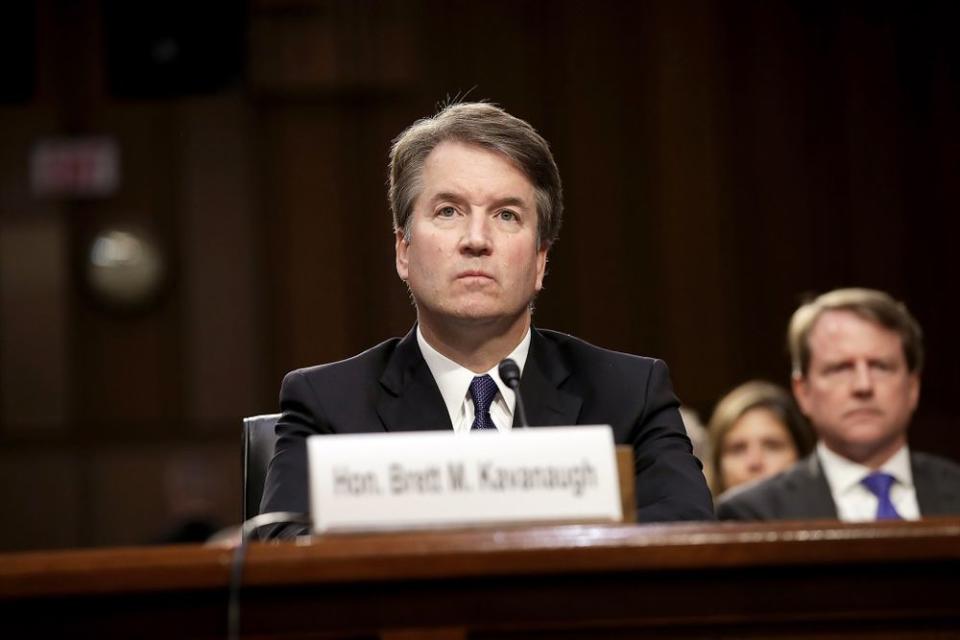Woman Who Accused Brett Kavanaugh of Sexual Assault Comes Forward: 'He Was Trying to Attack Me'
After previously choosing to remain anonymous, the woman who claimed that President Trump’s contentious Supreme Court nominee Brett Kavanaugh sexually assaulted her at a party in the 1980s has chosen to come forward.
In an interview with The Washington Post, the woman identified herself as Christine Blasey Ford, a 51-year-old research psychologist and professor at Palo Alto University.
Ford claimed that the incident — which she said occurred in Montgomery County, Maryland in the early 1980s — began when Kavanaugh, who was allegedly heavily intoxicated, pushed her into a room at a party and then held her down against a bed. At the time, they were both in high school.
According to Ford’s account, Kavanaugh then groped her and tried to remove her clothes.
“I thought he might inadvertently kill me,” Ford told the newspaper. “He was trying to attack me and remove my clothing.”
She went on to allege that she was able to free herself after one of Kavanaugh’s friends and fellow classmates at Georgetown Preparatory School, Mark Judge, who had been in the room the whole time, jumped on them.
RELATED: Brett Kavanaugh Allegedly ‘Attempted to Force Himself’ on Woman in High School, New Report Reveals
In response to the story, the White House re-issued an earlier statement of Kavanaugh’s to the Post.
“I categorically and unequivocally deny this allegation. I did not do this back in high school or at any time,” he wrote.
The White House did not immediately respond to PEOPLE’s request for comment.

Ford went on to confirm that she first sent a letter detailing Kavanaugh’s alleged sexual assault via U.S Rep. Anna Eshoo’s office to California Sen. Dianne Feinstein, the senior Democrat on the Senate Judiciary Committee, which is responsible for upholding or rejecting Kavanaugh’s nomination to the Supreme Court.
Around the same time, she also contacted the Post but declined to speak to the newspaper on the record. However, as her private story began being publicly reported on, she felt “like my civic responsibility is outweighing my anguish and terror about retaliation.”
According to the Post, Ford also took a polygraph test administered by a former FBI agent in August regarding the truthfulness of her allegations, which she passed.
RELATED: Sexual Misconduct Allegations Against Brett Kavanaugh Sent to Federal Investigators: Report
News of the woman’s sexual misconduct allegations first surfaced in a report from the New York Times on Thursday, which claimed Feinstein sent the letter on Thursday to federal investigators, after having informed her fellow Democrats on the Judiciary Committee about its contents the previous day.
Sen. Feinstein went on to confirm that she had “referred the matter to federal investigative authorities” and declined to comment on the contents of the letter.
The White House went on to claim that the letter was merely an “11th hour attempt to delay” Kavanaugh’s nomination, according to a statement provided to PEOPLE on Thursday.
“Throughout his confirmation process, Judge Kavanaugh has had 65 meetings with senators — including with Senator Feinstein — sat through over 30 hours of testimony, addressed over 2,000 questions in a public setting and additional questions in a confidential session. Not until the eve of his confirmation has Senator Feinstein or anyone raised the specter of new ‘information’ about him,” White House spokeswoman Kerri Kupec said.
Kupec went on to accuse Senate Democratic leader Chuck Schumer of playing games to hold up Kavanaugh’s confirmation to the high court.
“Senator Schumer promised to ‘oppose Judge Kavanaugh’s nomination with everything I have,’ and it appears he is delivering with this 11th hour attempt to delay his confirmation,” Kupec added in the statement.

Details of the allegation were then published in a new report from Ronan Farrow and Jane Mayer in The New Yorker one day later.
Kavanaugh “categorically and unequivocally” denied the woman’s allegations, telling the publication, “I did not do this back in high school or at any time.”
In the report, the woman also claimed that a classmate of Kavanaugh’s, whom the magazine did not identify by name, was allegedly in the room at the time, the woman claimed. The classmate reportedly told the outlet, “I have no recollection of that.”
RELATED VIDEO: PEOPLE Writer Natasha Stoynoff Breaks Silence, Accuses Donald Trump of Sexual Attack
In an op-ed for Los Angeles Times published on Sunday, Feinstein confirmed she would vote against Kavanaugh’s nomination — and urged Republicans to do the same, although it would mean going against Trump.
“Supreme Court justices should not be an extension of the Republican Party,” she wrote. “They must also have unquestionable character and integrity, and serious questions remain about Judge Kavanaugh in this regard, as indicated in information I referred to the FBI.
However, in an interview with Fox News Sunday, Sen. John N. Kennedy predicted that “every Republican will vote for Judge Kavanaugh,” according to Politico.
“They’ve had this stuff for three months; if they were serious about it, they should have told us about it,” he added.
If approved by the Senate, Kavanaugh, 53 — who currently serves as a judge on the U.S. Court of Appeals for the District of Columbia Circuit — would take the seat of Justice Anthony Kennedy following his retirement from the bench.
The Judiciary Committee is currently expected to vote on Kavanaugh’s nomination on Sept. 20.
If you or someone you care about is affected by sexual violence, contact the National Sexual Assault Hotline: 1-800-656-HOPE (4673).

